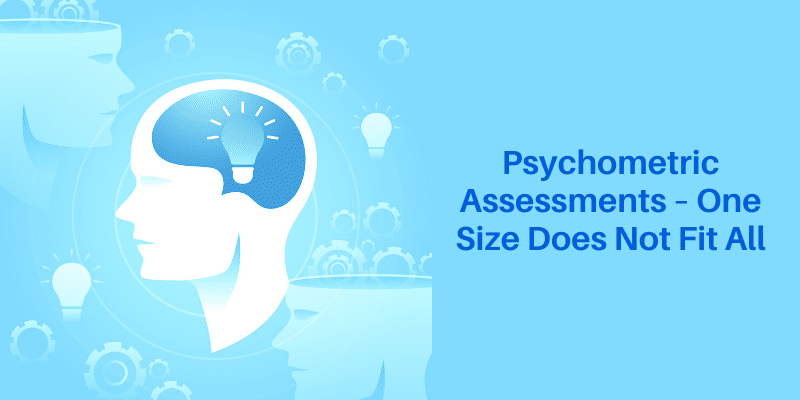They say ‘Do What You Love’ or ‘Love What You Do’. A psychometric test helps understand which side of the fence one is on. Doing what one loves gives the best chances for success.
Loving what one does makes one competent in that field of work. The most successful professionals have always chased excellence in their respective fields. Seldom do people have the right type of guidance early on in their life. Most people get to their dream-jobs or professions through trial-and-error while the others simply do jobs for the sake of it.
Since the inception of psychometric tests a few decades ago, things have changed drastically. These tests use scientific methodologies to measure a person’s aptitudes in multiple cognitive areas.
From numerical reasoning to mathematical abilities to communication skills to flair for people management, the areas of assessment are countless. Every individual is unique; and with billions of people in the world, each person has something unique to offer. This is where Psychometric Assessment comes into play.
Why One or Two Psychometric Tests Are Not Enough?
Often people make the mistake of taking non-verified psychometric tests through online portals. Even worse, they take only a couple of tests to adjudicate the complete spectrum of capabilities and aptitudes of a person.
Simply put, this is not enough, because a broad spectrum of psychometric assessments is required to completely assess a person’s cognitive and physical faculties. This also includes types of psychometric assessments that judge a person’s psychological and even physiological readiness for professional pursuits.
It has to be said that all of this is based purely on scientific methods, and can only be taken from a professional organization.
What Are the Various Types of Psychometric Tests Online?
There are three areas of focus in this regard:
- Aptitude – what the person is innately good at.
- Interest – the belief systems of a person; their outlook; their interests; their personal benchmarks.
- Personality – Introvert, extrovert, ambivert
Best psychometric assessments of personality available online:
-
Idealistic Career Finder
In these tests, the focus is to get the assessee to understand the kind of job that is suited for them by creating apt psychometric assessments online. For students, it can serve as an early beacon to help them find their direction.
For professionals in unfulfilling professions, it can serve as an eye-opener. In the case of professionals, research suggests that most professionals are trying to fit into their jobs rather than being the automatic best-fit for their jobs.
There is also the pressure to seek the so-called “high-in-demand” jobs. Job-seekers attain jobs that are totally unsuitable for them and as a result, fail to excel at their jobs.
The ideal career psychometric assessments for students recommend scores of jobs based on a person’s aptitude and interests. The constantly changing economy with new tools, technologies and industries is constantly giving rise to new job types.
A good ideal career test will retrieve all the types of jobs in the world and present the best matching ones. More often than not, students and professionals are amazed at the options that they see because they were not aware of these job types in the first place!
-
Personality Type Checker
Every person is unique. They have unique abilities, talents, and skills. It is simply not right to compare people because no two people are the same. If one person is good at athletics, another is good at selling, while another person is good at programming. What all this means is that personality type matters!
Personality can be defined as a combination of a person’s beliefs, interests, outlook, reactions, talents, abilities and natural skills. It is much more in essence, because the personality of a person is a culmination of millions of psychological and physiological factors.
Unfortunately, the world only produces one Einstein in a century, one Usain Bolt in decades, and one Bill Gates probably in the whole of mankind’s timeline. This is because most people have not understood their personalities and how they can use their strengths as a tool to define their vision, and achieve it.
A personality type psychometric test or assessment typically stays away from judging a person’s numerical, mathematical, linguistic or reasoning capabilities. Rather it estimates the emotional response of a person to different stimuli.
The stimuli could be a job-type, a hypothetical situation, an event, a decision and so on. Different people react differently to situations. This applies to their jobs or would-be jobs as well. A personality type test can help a person understand if they can cope up with stress, work in a team, lead a team, work as an individual contributor, speak in public, share information, share knowledge, collaborate, be inventive, speak up, be bold, be assertive etc.
All of this information is critical to understand if a job-type is suitable. A person in a leadership position will fail if they don’t have people skills, assertiveness, proactivity, patience, trust etc. A person in a technical job will not succeed if they don’t have attention to detail, ability to cope with stress, an active mind, value for the timeliness, collaborative skills etc.
A person in a medical field might find it difficult if they cannot handle large numbers of people, noise, large amounts of information, patience etc. All of this creates the need for a comprehensive psychometric assessments test that checks for the full gamut of a person’s capabilities and maps them to the right job types.
A personality psychometric test will also help a student or professional define their vision. Most people miss this part because they don’t have a goal in mind. This is akin to drifting aimlessly – a potential recipe for disaster.
Once the vision is defined, only the direction matters. For example, if a student understands that their personality type is ideal for a human resources career, they can work in that direction – the student can harbor dreams of becoming a human resources professional.
Similarly, a working professional who was always interested in music, can start training in music, and take small steps to realize their dreams.
Theory of Multiple Intelligences Assessment
When it comes to the topic of intelligence, the immediate thought that comes to mind is the abbreviation – IQ or intelligence quotient. There are plenty of IQ tests that measure a person’s ability to decipher complex information, understand patterns etc.
A person’s IQ is also related to their keen sense of perceptions when it comes to hearing, seeing, and smelling too. However, over the past decade, newer theories, principles and practices have emerged. All of these theories put forward one fact – no two people are the same; and everybody’s brains are wired differently.
So what exactly is the theory of multiple intelligences? It was formulated by Howard Gardner, a prominent professor at Harvard University. His theory suggests that psychometric tests or assessments are not an indicator of a person’s intelligence level.
Traditional psychometric tests only measured a small spectrum of the broad range of capabilities of people. Rather, there should be a test that measured people on eight types of intelligence that includes musical intelligence, visual-spatial, language skills, interpersonal/intrapersonal, mathematical, physical, spiritual and flora-and-fauna intelligence.
- Musical intelligence – Some people are in love with sounds, rhythms, and music in general. They are naturals at singing, playing musical instruments, and creating any material related to music. Their sensitivity to understanding musical intricacies is higher. Their minds are predisposed to processing musical patterns; recognizing new sounds etc. A psychometric test can help realize a person’s musical talents and priorities in their overall scheme of things.
- Visual-spatial – Visual people understand information best if they are able to create mental models that involve pictures, images or visuals. Spatial ability is closely related to visual ability. Spatial ability is the knack of ascertaining dimensions, retaining and reproducing it in its true fidelity. An example is how painters created visual representations of the world.
- Mathematical – Some people are blessed with logical thought. They are able to rationalize information. Their minds are good at analysis and critical thinking. Unfortunately, most of the so-called IQ tests are based on mathematical ability. Those with high mathematical abilities score better in these tests. But mathematical capabilities alone are not an indicator of a person’s IQ. Psychometric assessments test a person’s ability to deal with logic, reason, numbers, analysis, critical thinking.
- Language skills – If all people were mathematicians, there would be no writers and painters! Language skills are a set of capabilities that are related to oration, writing, communication, influencing, creating new languages, learning new languages etc. Language skills are also closely related to interpersonal and intrapersonal skills. Psychometric tests in this regard help understand these strengths clearly.
- Interpersonal/intrapersonal – Those with interpersonal skills can handle other people. They are receptive to other people’s thoughts, emotions. They have a high sense of empathy. Most of them are extroverted and able to freely mingle with people. Generally, such people are good fits for leadership positions. Intrapersonal skills on the other hand are related to self-discipline, metacognition, and reflective capabilities. Such people have a deep understanding of themselves, and everything that is happening around them. Their sense of time and being is unique, and their high emotional intelligence can help them be counsellors or teachers.
- Physical – Athletes, sportspeople, and sports lovers are comfortable in roles that require physical activity. They understand their bodies, and their physical abilities to become fitness enthusiasts, fitness trainers, sports persons etc. Many are born with natural physical abilities to perform, compete, portray in sporting activities or as celebrity fitness models.
- Spiritual – Almost every person will undergo an existential crisis at some point in their life. At such junctures, they look towards a spiritual source of inspiration to resolve their existential angst. Spiritual people have natural abilities of introspection, attaining wisdom, understanding the dynamics of existence, and building a model of everything – mind, material and matter. They are extremely sought-after by the general population to resolve their queries on family, career, life, relationships and so on. Most often than not spiritual people understand this gift of theirs without any psychometric test.
- Flora-and-fauna intelligence – Naturalists like Charles Darwin had a keen sense of observation. Darwin’s observational skills led to his writing the book ‘The Origin of Species’. Naturalists are also those who like agricultural activities, who are in love with plants, flowers, trees. Those who find pleasure and comfort in farming. Such people have a natural ability in biological sciences. They are able to understand and interpret all aspects of the natural world without much exertion because that is where their interest lies.
Learning Styles Assessment
Not everyone learns fast. Not everyone learns slowly. Learning is an inherent process. A psychometric test that incorporates learning styles assessment understands the learning styles of assesses. Just like there are multiple types of intelligence, there are various types of learning styles as well, because all people are different.
- Visual learning style – Those with high visual-spatial intelligence can learn fast if the information is presented in the form of visuals. To cater to these types of learners, there are many learning materials that use infographics and illustrations. If a picture is worth a thousand words, visual-spatial learners grasp the picture faster than others.
- Auditory learning style – In this type of learning style, the learner grasps information by hearing. Often in school or college, we have heard about students who don’t take down notes, yet score high marks in exams. Those with auditory learning style have a high attention span, can listen carefully to information and remember it when required.
- Read/write learning styles – Reading and writing gives a chance to interact with information, ask questions in the mind, answer them and move forward. Often this type of learning style is combined with other learning styles to make the learning a complete one. Writers, authors and those with high language skills tend to prefer this style of learning more. A psychometric test can reveal this hidden learning style of assesses – which can serve them well.
- Experiential learning – All knowledge is obsolete if it can’t be remembered. Knowledge is best remembered when it is applied. Its common knowledge that applied learning and knowledge is the best, fastest way to learn. Often, experiential learning is definitive as it produces a long-term retention of the learning.
Now that concludes the different types of psychometric assessments. But the good news is that it still doesn’t end at that! Let’s assume that a student decided to pursue a career in engineering. Although the decision is commendable, the confusion for the student is still not resolved given the various engineering streams on offer.
The dilemma is not just for engineering students; it’s applicable for commerce students as well. Even for students of humanities, life sciences, biosciences, sports education and the list goes on. Given this premise, when a student graduates out of school and is decided on their career path, the next level of help they need is to choose the right stream.
Engineering Studies Selector
This is a novel psychometric test that helps thousands of students realize their potential without ending up as engineers of incompatible engineering disciplines. A student who is good at logic and mathematics, can do well as a programmer; it will not be very helpful if this person does civil engineering.
Whereas a student who is good in visual-spatial skills can find civil engineering easy to read and understand. Almost all engineering disciplines require math, but mathematics differs by engineering discipline. Electrical engineers do not deal with as much discrete math as computer engineers do. Computers engineers don’t do math related to fluid dynamics as much as mechanical engineers do. So all of these factors need to be considered before choosing an engineering discipline.
Humanities Studies Selector
Humanities is a broad field consisting of various disciplines such as visual arts, literature, anthropology, performing arts, religion, archaeology, politics, law, literature and philosophy to name a few. There are subdivisions to specialize too. For example, in performing arts there are sub-disciplines such as music, theatre, and dance. In archaeology there are biofacts, lifeways, cultural history, architecture and artifacts.
Preparing for Psychometric Assessments
The following pointers provide some insight on how to prepare for psychometric assessments.
- Learning about psychometric tests delivered helps understand what to expect. It molds the mind and prepares oneself for the upcoming assessments.
- Being in good physical and mental shape helps give the best psychometric assessment. Often the tests could be skewed or not portray a realistic picture of a person’s capabilities if the person has taken the tests in a bad state of mind.
- Honest and truthful answers to psychometric tests yield the truest results and that can dictate one’s destiny. Not everyone needs to have the same destination so it is important to start being the person one wants to be by giving honest answers to psychometric assessments. India and many countries are creating specialized pools of talent based on these psychometric assessments of personality which produce next-generation leaders, musicians, entrepreneurs, sportspersons and the list goes on.
There is infinite value in taking up psychometric assessments for students and professionals. Not only does it provide an assessment of innate talents, but also provides the direction to take – that is most often lacking in most students and professionals.
Sukriti is a Hyderabad-based Writer, covering the exciting world of Career Counselling and Entrepreneurship. She also writes about mega-trends in education, diversification for Teachers & other individuals with a focus on how innovation and upskilling can help them grow professionally. She is an MBA in Public Relations & Event Management. When she is not trying to understand complex changes & needs in the counselling and education industry, she enjoys travelling and watching movies with a cup of black ginger tea.













4 Comments
Thanks for sharing more information, insights, innovations on psychometric tests…
Glad you enjoyed reading this.
Wonderful write up and very well explained.
Thank you
Thank you, Ranjana. Glad it helped you in some way. 🙂